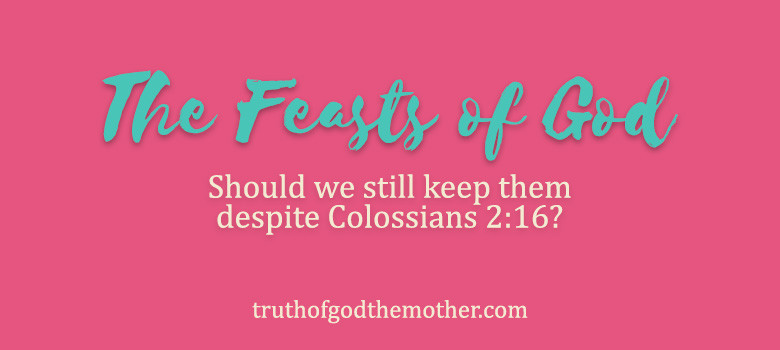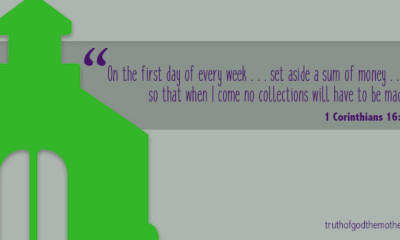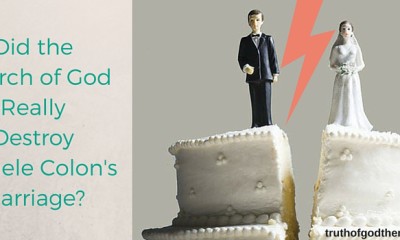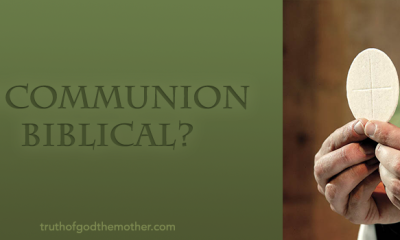The WMSCOG and the Feasts of God, Part 2
In part 1 of this series, I wrote about the feasts of God and people’s excuse for not keeping them. They use Hosea 2:11 to claim that God Himself took the feasts away. However, God took the feasts away, as punishment, from those who disregarded God’s laws and worshiped Baal (the sun god).
Throughout the Bible, God repeatedly commands His people to celebrate the feasts of God year after year throughout the generations to come. Yet, mainstream Christians who do not celebrate the feasts of God claim God abolished them. Another verse people use is in the book of Colossians. In this post, I will explain why this verse does not mean we should not keep the feasts of God.
People interpret this verse saying God meant that we do not need to celebrate any feast. If this were true, why do the same people who claim we don’t need to keep the feasts of God observe Sunday worship or Christmas as “religious festivals to God”? If Christians don’t need to keep the feasts of God then we don’t need to observe any religious festival at all.
First of all, it’s important to understand who wrote the book of Colossians. Apostle Paul. Apostle Paul wrote Colossians 2:16, which Christians claim to mean that we do not need to keep the feasts.
Yet, Apostle Paul kept all the feasts of God.
Apostle Paul kept the Sabbath day.
Acts 17:2 (NLT) As was Paul’s custom, he went to the synagogue service, and for three Sabbaths in a row he used the Scriptures to reason with the people.
Acts 18:4 (NLT) Each Sabbath found Paul at the synagogue, trying to convince the Jews and the Greeks alike.
Apostle Paul also kept the New Covenant Passover—the first set of feasts of the year.
1 Corinthians 5:7 (NCV) Take out all the old yeast so that you will be a new batch of dough without yeast, which you really are. For Christ, our Passover lamb, has been sacrificed. So let us celebrate this feast.
When Apostle Paul wrote, “Therefore do not let anyone judge you by what you eat and drink, or with regard to a religious festival, a New Moon celebration or a Sabbath day,” he was not referring to the New Covenant feasts of God, which Christ taught us to observe.
What feasts was Apostle Paul referring to in Colossians?
Apostle Paul was referring to the Old Covenant laws. It’s important to understand the difference between the feasts in the Old Covenant and the feasts in the New Covenant. Through the Old Covenant, the people offered animal sacrifices as offerings during the feasts.
When Jesus came to the earth, He fulfilled all the burnt offering for all the feasts through His crucifixion. And He established the New Covenant, giving us a new order—a new way—of keeping the feasts. They are the same feasts God commanded us to keep generation after generation. Only the way of keeping the feasts has changed. It does not mean we should not keep the feasts at all. It means we must keep them according to the way Christ taught us.
Colossians 2:14 (NCV) He canceled the debt, which listed all the rules we failed to follow. He took away the record with its rules and nailed it to the cross. God stripped the spiritual rulers and powers of their authority. With the cross, he won the victory and showed the world that they were powerless. So do not let anyone make rules for you about eating and drinking or about a religious feast, a New Moon Festival, or a Sabbath day.
In those days, the people of Israel judged the Christians for keeping the feasts in accordance with the New Covenant and not according to the Old Covenant. They even persecuted Christians. In the book of Colossians, Apostle Paul explains to the members of the early Church that they do not need to keep the Old Covenant feasts. He encourages them to continue following Christ who set the example of keeping the feasts according to the New Covenant.
Colossians 2:16 (NLT) So do not let anyone make rules for you about eating and drinking or about a religious feast, a New Moon Festival, or a Sabbath day. These things were like a shadow of what was to come. But what is true and real has come and is found in Christ.
The Old Covenant was only a shadow.
Hebrews 10:1 (NLT) The old system under the law of Moses was only a shadow, a dim preview of the good things to come, not the good things themselves.
The law of the Old Testament was only a shadow of the reality. Christ is that reality. To keep the feasts correctly, we must do so in accordance with the regulations of the New Covenant, which Christ taught. Apostle Paul never taught the early Church to not keep the feasts of God. Instead, he set the example of keeping the feasts. And he encouraged members of the Church to not let anyone tell them they should keep the Old Covenant laws.
I hope this helped clarify any misunderstanding about whether or not we should keep the feasts of God. If you have questions about the Old Covenant and the New Covenant, visit your local Church of God. I encourage you to study more in detail about the feasts of God and God’s blessings promised to those who keep them.




People tends to visit their parents and relatives during the holidays or feasts to share their love and happiness together. In the same way, when we gather together to meet God during the feasts, God allows abundant blessings and love.